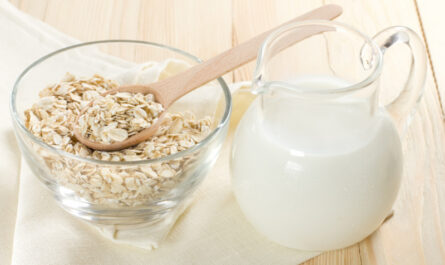Oat milk has seen tremendous growth in popularity in recent years and is fast emerging as one of the most popular plant-based milk alternatives. With its creamy and subtle flavor, oat milk appeals to both vegans looking for a dairy substitute as well as health-conscious individuals seeking a nutritious beverage. In this article, we take a deeper look at oat drink and why it has captured the hearts and glasses of consumers worldwide.
The Nutritional Profile of Oat Milk
Oats are highly nutritious and packed with various vitamins, minerals, and antioxidants. Oat milk retains many of these nutrients even after processing. Some key nutrients present in oat milk include:
– Protein: Oat milk contains between 1-2 grams of protein per serving, making it a good plant-based source. The proteins in oats also help give oat milk its creamy texture.
– Vitamins: Oat milk is a good source of various B vitamins like riboflavin, niacin, Vitamin B12 and Vitamin D (in fortified varieties).
– Minerals: It contains minerals like calcium, phosphorus, magnesium and potassium. Fortified varieties may also contain iron.
– Dietary Fiber: Oats are a good source of soluble fiber called beta-glucans which are known for their cholesterol lowering benefits. One cup of oat milk provides 1-2 grams of fiber.
– Antioxidants: Oats contain antioxidants like avenanthramides that have anti-inflammatory properties.
The light, creamy texture and mild flavor of oat milk makes it a versatile beverage that can be enjoyed on its own or used in café lattes, smoothies or baking. Its nutrition profile also appeals to both health-conscious consumers looking to manage calorie and cholesterol intakes as well as vegans seeking a dairy alternative.
Rising Demand and New Product Innovations
According to market research, global sales of oat milk grew over 300% between 2018-2019, making it one of the fastest growing plant-based milks. Major brands like Oatly, Planet Oat and Califia Farms have vastly increased their product portfolios and distribution to meet rising consumer demand.
Some innovative product launches in the oat milk sector include:
– Barista editions: Specialized oat milks for use in coffee drinks that have creamier textures for layering.
– Flavored varieties: Companies now offer oat milks in flavors like vanilla, chocolate and coffee to appeal to different taste preferences.
– Cultured oat drinks: With cultures like Lactobacillus added for a yogurt-like texture. These have a slightly sour taste.
– Low calorie options: For consumers watching their weight or calorie intake, some brands offer oat milks with fewer calories than regular varieties.
– Protein-enriched versions: Formulated with added protein for muscle-building benefits.
– Specialized versions: Suitable for baking, cooking or cereal due to formulation adjustements.
Sustainable credentials and manufacturing processes have also improved. Many oat drink companies now use certified organic oats and practice sustainable agriculture. New micro-milling techniques extract maximum nutrients from oats. Large investments are being made in research and development to further enhance the sensory attributes of oat milk for various uses. This level of innovation ensures Oat Drink can compete effectively against all categories of plant milks.
Health and Environmental Benefits
Aside from its pleasant taste, oat milk boasts several nutritional and health benefits compared to cow’s milk:
– Lower in fat and calories: Oat milk contains only 50-60 calories and 1-2 grams of fat per serving versus 150 calories and 8 grams of fat in cow’s milk. It can aid weight management.
– Easy to digest: Oat milk poses fewer digestive issues than dairy milk thanks to its low protein and lactose-free composition. It is often recommended for people with gastrointestinal conditions.
– Cholesterol-free: Unlike cow’s milk which contains cholesterol, oat milk has no cholesterol content, making it a heart-healthy choice.
– Glycemic control benefits: The soluble fiber in oats (beta-glucans) helps slow glucose absorption and may benefit glycemic control in diabetics.
– Anti-inflammatory: Compounds in oats called avenanthramides have been shown to exert anti-inflammatory effects throughout the body.
Environmentally, oat milk production has a significantly lower carbon footprint than dairy. Oats require less water and land to cultivate than cows. Their use alleviates methane emissions from cattle grazing and manure. With a sustainable agricultural model, oat milk brands ensure minimal impacts on soil, water and biodiversity.
Potential Drawbacks
While oat milk clearly has multitude health and sustainability advantages, it does have some limitations:
– Higher price point: Currently, oat milk often costs more than cow’s milk or other plant milks like soy or almond. Mass production could lower costs over time.
– Nutrient variability: The specific vitamin/mineral composition of oat milk depends on brand and fortification practices. Not all may match the protein levels of cow’s milk.
– Thicker consistency: Oat milk is creamier than dairy but its thickness may not suit some recipes traditionally using skim or 1% cow’s milk. Dilution or specialized recipe adjustments help overcome this.
– Oat intolerance: While rare, some individuals report digestive discomfort from consuming oats, gluten or certain FODMAPs they contain. They need an alternate milk choice.
– Processing requirements: Oats must undergo milling, extraction and pasteurization to yield an oat beverage, making it slightly more processed than simply drinking oat porridge.
Outlook
With its subtle taste, versatility across food applications and proven nutritional qualities, oat milk is here to stay as one of the top plant-based milk choices. Major brands continue investing heavily in new innovations, improved formulation technologies and increased production capacities in step with consumer trends. Alternative milk consumption is projected to grow at 11% annually, signifying oat milk still has plenty of room for market expansion. As popularity rises, prices should gradually fall, further boosting accessibility. Overall, oat milk shows strong potential to become a leading dairy milk substitute worldwide.
*Note:
1. Source: Coherent Market Insights, Public sources, Desk research
2. We have leveraged AI tools to mine information and compile it.



